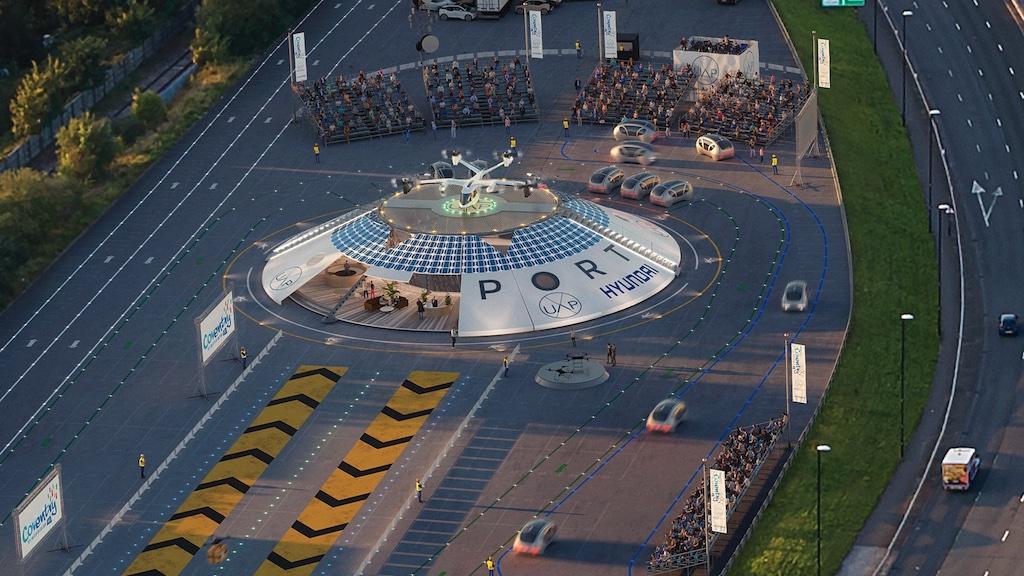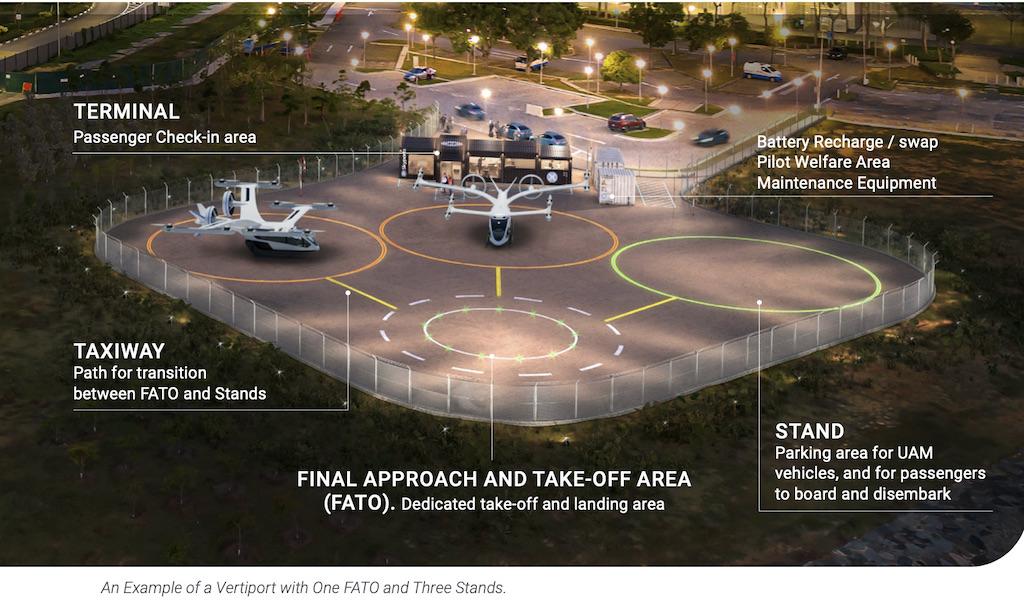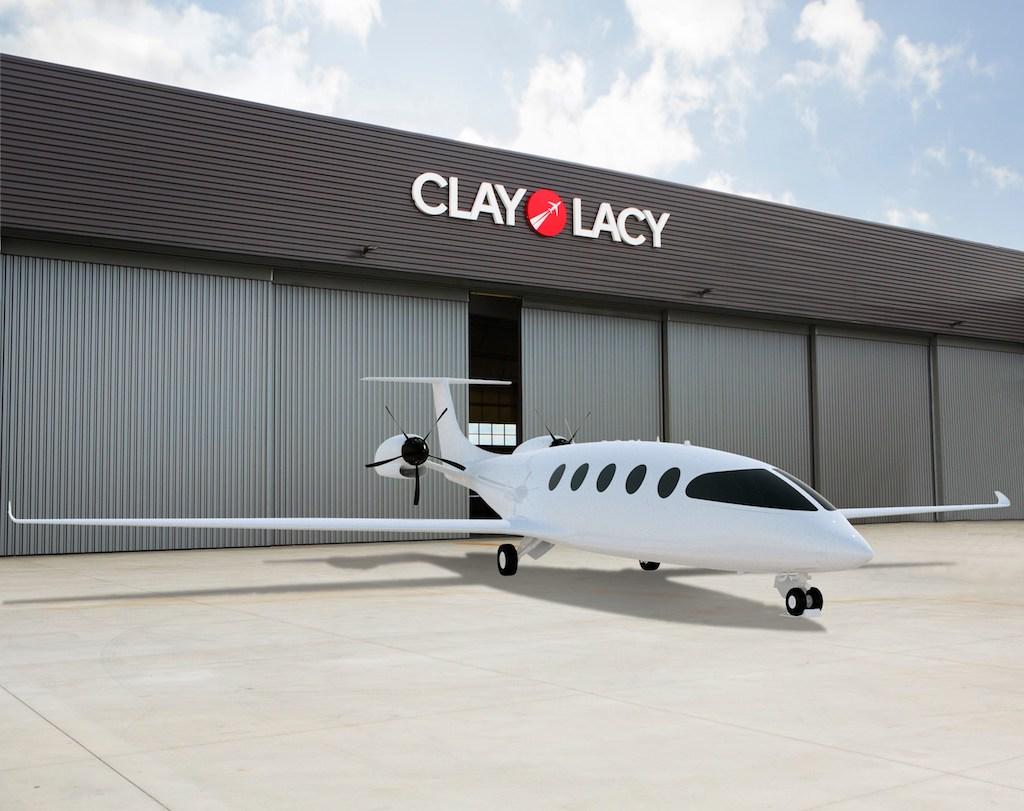
Hard on the heels of new advanced air mobility (AAM) projects, ground infrastructure developers are building or planning launch and landing sites for a new generation of electric aircraft.
The fast-emerging AAM segment also presents a growth opportunity for airports and business aviation FBOs with existing infrastructure to support aircraft operations, assuming they can supply adequate electrical power or store and exchange batteries at their locations.
“I do believe our current FBO structure is in a position to benefit,” says Ryan Waguespack, National Air Transportation Association (NATA) executive vice president of aircraft management, air charter services and MROs. “What is challenging is these aircraft are developing at such a rapid pace [while] infrastructure takes a lot longer.
“It’s going to pop up in pockets,” Waguespack predicts. “You’re going to see [AAM routes] in key markets, let’s say New York to D.C., or South Florida to Mid-Florida.”
In late April, AAM ground infrastructure developer Urban-Air Port Ltd. unveiled its Air One deployable operations hub for electric vertical takeoff and landing (eVTOL) aircraft in a parking lot in Coventry, U.K., 100 mi. northwest of London. Erected in 11 weeks and planned for redeployment to other cities later this year, the prefabricated, 17,000-sq.-ft. radial structure is divided into zones that include a passenger lounge, cargo logistics hub, air vehicle hangar and control center. At the hub of the structure is a circular final approach and takeoff (FATO) platform that elevates to 19 ft.
U.S.-based Supernal, a Hyundai Motor Group company that is developing an eVTOL aircraft for entry into service in 2028, has partnered with Urban-Air Port to display its SA-1 concept vehicle in the Air One hangar. Headed by Jaiwon Shin, formerly associate administrator of the NASA Aeronautics Research Mission Directorate, Supernal is also involved in AAM development efforts in Miami and Los Angeles.
Vertiport Developments

Vertiport developers in the U.S. have unveiled their own projects. Among them, real-estate development firm DIFCO, of Davenport, Iowa, said April 11 that it had started constructing an eVTOL vertiport in Rock Island, Illinois, declaring it the first such aeromedical facility in the U.S. Start-up Volatus Infrastructure unveiled plans on March 25 to erect a modular vertiport by late summer or early fall at Wittman Regional Airport in Oshkosh, Wisconsin, site of the annual Experimental Aircraft Association AirVenture Oshkosh airshow.
Many of the recently announced projects are spearheaded by ground infrastructure developers that intend to build and operate their own sites. “We will deliver an end-to-end solution, starting from identifying sites through to designing, permitting, building and then ongoing operation of the vertiport,” says Addison Ferrell, head of Americas for London-based Skyports. “That’s what we intend to deliver.”
Skyports demonstrated a temporary “VoloPort” in Singapore in 2019 and plans to install a test vertiport in Paris for the 2024 Summer Olympics. At the 2022 Singapore Airshow in February, Skyports and German eVTOL aircraft manufacturer Volocopter signed agreements to explore options for using the local Seletar Aerospace Park. Singapore’s government has expressed support of the companies launching operations within the Greater Southern Waterfront development, as well, says Ferrell.
The startup company plans to build vertiports in other locations--plans that don’t preclude participation by FBOs to fill gaps in a future Skyports network. “We do look for opportunities to partner, and airports and FBOs are an instance where we might not [provide] the whole value chain,” Ferrell says. “But what we are really, frankly, most keen on is the ongoing operations. Whatever that looks like in a specific instance, whether it’s partnering with an FBO or an airport, we would do it.”
Beta Technologies, based in Burlington, Vermont, has raised $796 million from venture capital and institutional investors to advance development of its Alia-250 eVTOL aircraft and supporting network of 65 charging sites, which includes on- and off-airport stations, extending from Burlington to Melbourne, Florida, and Bentonville, Arkansas. Beta has booked orders and options for the Alia from UPS Flight Forward, Blade Air Mobility, United Therapeutics and aircraft lessor LCI.
Beta says it is “taking a few different approaches” to deploying a multimodal charging infrastructure that will work for electric cars, delivery trucks and buses, as well as aircraft. “In addition to rolling out our owned-and-operated charging stations along the road, we are working with FBOs and airports to design our network to strategic endpoints that are owned and operated by our customers, such as a distribution center,” Beta says in response to an inquiry.
FBOs Eye AAM

Already, several FBOs and fractional fleet operators have announced partnerships with AAM vehicle manufacturers to support or operate their aircraft. In early 2021, booking platform provider Blade Air Mobility announced agreements with FBO operator Ross Aviation--which later announced a merger with Atlantic Aviation--to build a vertiport for eVTOL aircraft at Westchester County Airport, New York, and with Vertiport Chicago to station eVTOLs in that city.
Electric aircraft developer Joby Aviation, JetBlue Airways and FBO Signature Flight Support announced a partnership in July 2021 to anchor a market for aviation carbon credits.
The FBO division of Luxembourg-based Luxaviation Group has partnered with Germany’s Lilium to support “airline operations” of the seven-seat Lilium Jet eVTOL aircraft and with French airport management company Edeis to support “common deployment” of AAM at 16 Edeis locations in France.
“FBOs are well positioned for the discussion,” says Heidi Williams, NBAA director for air traffic services and infrastructure. “For early [AAM] operations, we’re probably going to need to utilize existing infrastructure and that may develop into something that is separate to AAM. But I think largely what makes sense is utilizing that existing infrastructure where possible.”
Clay Lacy Aviation struck an agreement with Israel and U.S.-based Eviation Aircraft in September 2021 to provide charging for the Alice, Eviation’s planned nine-passenger, 440-nm-range electric aircraft. Powered by two tail-mounted 640-kW MagniX magni650 electric propulsion units with Hartzell propellers, the Alice is being developed toward the goal of certification in 2024.
Clay Lacy operates FBOs at Van Nuys and John Wayne Orange County airports in California and will open a new FBO and hangar complex at Waterbury-Oxford Airport, Connecticut, in 2023. It operates several FAR Part 145 repair stations in California and Connecticut.
“We founded our partnership with Eviation because as an FBO and a maintenance company we provide support to airplanes,” explains Scott Cutshall, Clay Lacy Aviation senior vice president of development and sustainability. “As planes start to transition to electric, we want to be able to support them from an FBO and an MRO capacity. Those are our business lines. I am a firm believer that electric aviation will dominate 500-nm-and-under [flights] in the future.”
Next: AAM On The Ground, Part 2, Different charging approaches.





